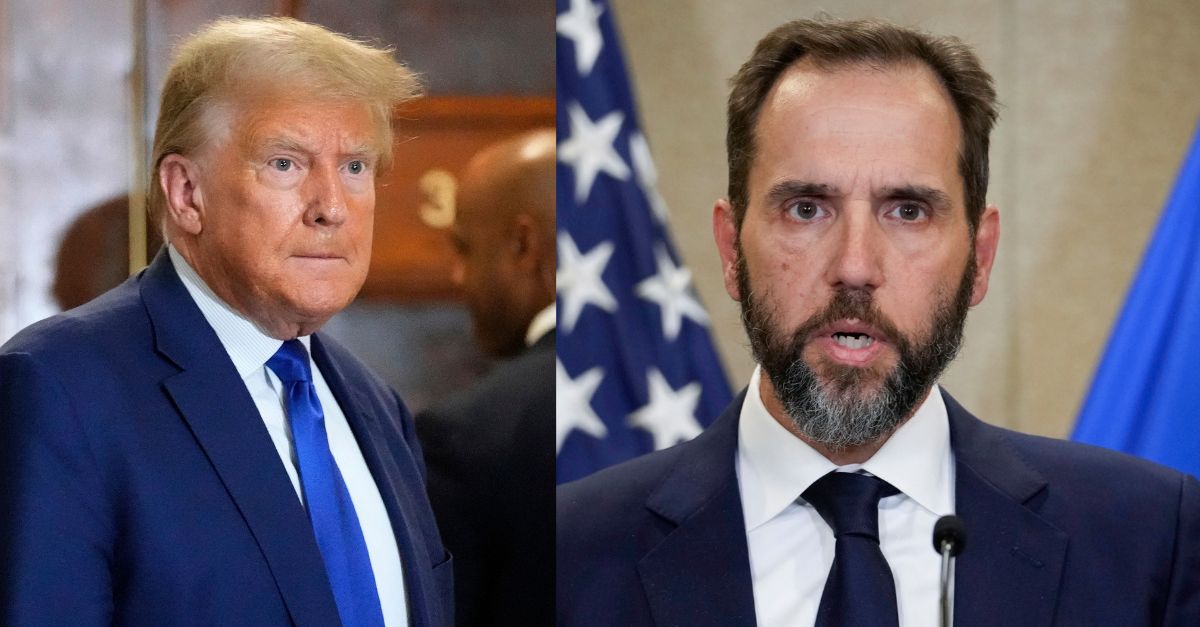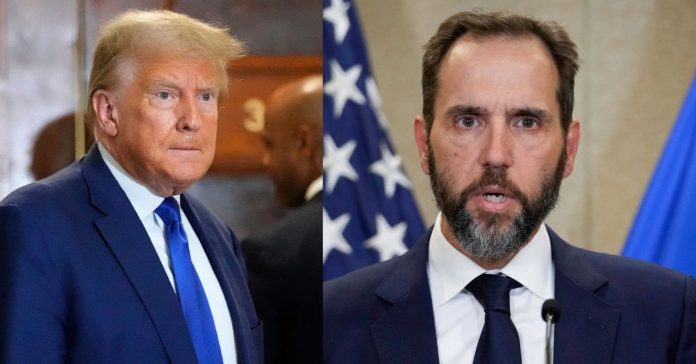
Right: Former President Donald Trump speaks during a break in his civil business fraud trial at New York Supreme Court, Wednesday, Oct. 25, 2023, in New York. (AP Photo/Seth Wenig/Left: Special counsel Jack Smith speaks to the media about an indictment of former President Donald Trump, Tuesday, Aug. 1, 2023, at an office of the Department of Justice in Washington. AP Photo/J. Scott Applewhite.
As an appellate fight swiftly approaches in Washington, D.C., weighing whether a narrow gag order imposed on Donald Trump in his election subversion case should remain in place, special counsel Jack Smith lobbed his opening volley Tuesday, urging the court to squarely reject the former president’s “scattershot” invocations of the First Amendment and enforce a gag order that will protect proceedings much like the lower courts have done in other high profile cases, including the indictment of Trump ally Roger Stone.
“There has never been a criminal case in which a court has granted a defendant an unfettered right to try his case in the media, malign the prosecutors and his family and after threatening witnesses, ‘IF YOU COME AFTER ME, I’M COMING AFTER YOU,’ target specific witnesses with attacks on their character and credibility, calling one ‘weakling’ and ‘coward’ and suggesting that another’s actions warrant the ‘punishment’ of ‘DEATH!”” Smith wrote Tuesday in a 67-page brief for the appellate court in Washington, D.C., quoting just a sampling of Trump’s remarks on social media or in the press since his indictment for conspiring to overturn the results of the 2020 election was first announced in August.
The gag order prosecutors want reimposed was temporarily stayed by the appeals court on Nov. 3. It was set by U.S. District Judge Tanya Chutkan on Oct. 16 after special counsel convinced her it was necessary given Trump’s habitual public lashing out.
Chutkan herself, prosecutors reminded the appeals court Tuesday, had received an extremely troublesome death threat from Trump supporter Abigail Jo Shry of Texas after Trump had railed against the judge and charges.
Shry called the Black judge a “n—– slave” who would be killed if Trump wasn’t reelected in 2024.
“That episode was part of a pattern, stretching back years, in which people publicly targeted by the defendant are, as a result of the targeting, subject to harassment, threats, and intimidation,” Smith wrote.
In that vein, special counsel highlighted remarks from billionaire Trump supporter Anthony Pratt, who explained the slippery method the former president deploys. In a 60 Minutes Australia piece aired only weeks ago, Pratt said of Trump:
“He knows exactly what to say and what not to say so that he avoids jail but he gets so close to it that he looks to everyone like he’s breaking the law,” Pratt said. “Like he won’t go up to someone and say, ‘I want you to kill someone.’ He’ll say, he’ll send someone, to tell someone, to kill someone.”
In the end, the gag order Chutkan set only barred Trump from disparaging witnesses and targeting court staff or prosecutors while leaving significant room for him to publicly criticize the trial venue of Washington, D.C., and the nature of the charges themselves. In an opening bid to the appellate court last week, Trump’s lawyers said the former president’s speech did not pose a “clear and present danger” to proceedings and if the appeals court did not rule in their favor, they would take their fight all the way to the U.S. Supreme Court.
Prosecutors, however, argue there is sufficient case law to support their request and ignore Trump’s “scattershot” attempts to invoke the First Amendment. Some of this precedent was only recently and very publicly established in a case featuring an equally vociferous criminal defendant: Trump ally Roger Stone.
When Stone was indicted in 2019 for obstructing official proceedings, witness tampering and making false statements to Congress about the role he played as an intermediary between Trump’s campaign and WikiLeaks, U.S. District Judge Amy Berman Jackson eventually gagged him. She had at first narrowly ordered Stone “not to discuss the case in any way” before later imposing a “blanket ban” that stopped him from using social media to target potential witnesses or court staff, Smith’s brief notes.
Like Trump, who goes to the press to litigate his case, Stone told reporters at BuzzFeed that testimony from then-witness Michael Cohen was a lie. Stone also reposted images and content on social media that targeted lawmakers and long before the gag was even placed, Stone had posted an image of Judge Jackson online with crosshairs close to her head, the New York Times reported in 2019.
Trump’s conduct is similar and equally inappropriate, Smith argued.
Trump does not warrant any “special exception,” and the appellate court, prosecutors say, should consider what the 11th Circuit already found in 2022 in Trump v. United States.
“To create a special exception here would defy our Nation’s foundational principle that our law applies to ‘all without regard to numbers, wealth or rank,’” Smith cited.
Regardless, even with a limited gag order, Trump could still find ways to communicate his feelings about the indictment, at least in part. Prosecutors noted he sent no less than 182 messages in the time between the order being placed and stayed.
“And in the four-and-a-half days between the time that was lifted and the time that this court issued the stay, the defendant posted another roughly 128 times to Truth Social,” Smith wrote.
Trump has denied any wrongdoing and pleaded not guilty to the allegations in Washington, D.C. He has routinely argued that he was not responsible for the events of Jan. 6, 2021, and has tried and failed to dismiss the case on these grounds.
Keenly aware of the First Amendment “invocations” Trump and his lawyers have made as they rail against “phony” insurrection charges, Smith articulated in Tuesday’s ruling that the indictment does not charge Trump with “incitement of insurrection.”
“It squarely alleges that he is responsible for the events of Jan. 6, 2021 where ‘lives were lost, blood was shed, portions of the Capitol building were badly damaged, and the lives of members of the House and Senate, as well as aides, staffers and others who were working in the building were endangered,’” he wrote.
Oral arguments at the appellate court get underway Nov. 20.
Have a tip we should know? [email protected]

